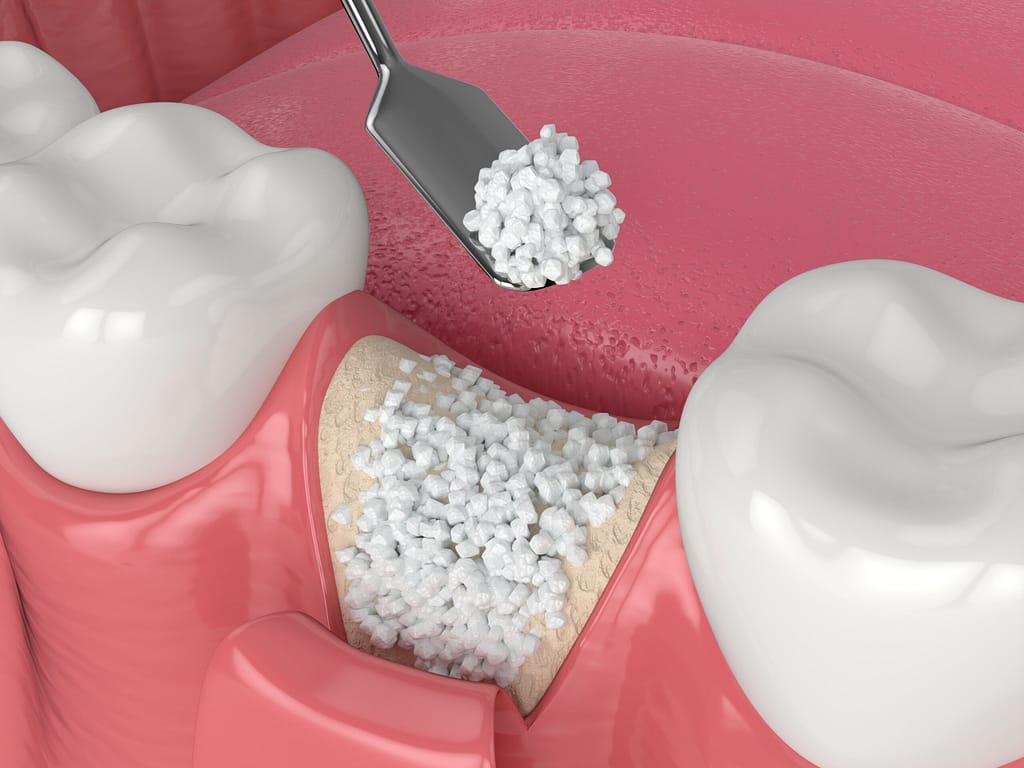What Is Bone Grafting, and Why Do I Need It?

The term “bone grafting” might sound a bit intimidating—we’ve all cringed at the thought of skin grafts. But in dentistry, bone grafting isn’t as scary as it seems. It’s a surgical procedure to repair and rebuild diseased or damaged bones. So, why might you need it? Let’s demystify bone grafting, exploring when and how this procedure becomes a crucial player in the world of dental care at Orchard Dental Associates.
Understanding dental bone grafting.
Dental bone grafting is a specialized procedure that focuses on rejuvenating the jawbone, enhancing its strength and density in areas affected by bone loss. This process involves introducing bone graft material, which can be sourced from different places:
- Autogenous graft (from your own body): Utilizes bone material from your own body.
- Allograft (from a human tissue bank): Involves bone graft material from a human tissue bank.
- Xenograft (from an animal tissue bank): Uses bone graft material from an animal tissue bank.
Dental bone grafting is often recommended before dental implant placement or to address bone loss impacting nearby teeth. Here’s a quick guide on who might benefit from a dental bone graft:
- Having a tooth extracted: To preserve jawbone integrity after extraction.
- Planning for a dental implant: Preparing the jawbone for a stable dental implant.
- Jaw reconstruction for dentures: Rebuilding the jawbone for denture support.
- Bone loss from periodontal disease: Addressing areas affected by gum disease.
Signs you may need a dental bone graft.
If you’ve lost an adult tooth or faced gum disease, the need for a dental bone graft may arise, especially when contemplating dental implants. When an adult tooth is lost, the surrounding bone gradually diminishes.
Similarly, gum disease can contribute to the recession of the jawbone, a subtle process that might not be immediately noticeable. Indicators that a dental bone graft might be necessary include:
- Having missing teeth: Missing tooth roots can deprive the jawbone of necessary stimulation, potentially leading to bone loss. Extended periods without dental implants after tooth loss may necessitate a bone graft.
- History of gum disease: Severe periodontal disease can extend beyond the gums, impacting the jawbone. Post-infection, bone grafts are often performed to prepare for dental implant surgery after tooth loss.
- Recovering from jaw injury: Trauma to the mouth or face resulting in jawbone fractures may lead oral surgeons to use bone grafts to restore the shape and mass of damaged bone tissues.
- Medical conditions affecting bones: Systemic health issues that impact bones may manifest in dental concerns, such as loose teeth. Routine dental checkups facilitate monitoring, with dentists recommending bone grafts when beneficial for jaw health.
If you resonate with any of these signs, consulting with Orchard Dental Associates can provide valuable insights into whether a dental bone graft is appropriate for your needs.
At Orchard Dental Associates, understanding the need for dental bone grafting is vital to comprehensive care. This procedure ensures a solid foundation for dental interventions, offering patients a path to restored oral health and the confidence that comes with it.
The painless nature of bone grafting.
Contrary to common fears, bone grafting in restorative dentistry, especially in preparation for dental implants, is not a painful procedure. This vital step in dental surgery is performed under anesthesia, ensuring virtually no pain during the process. Once the bone grafting is complete, patients may experience some post-surgery effects, such as swelling, bruising, bleeding, and mild discomfort as the anesthesia wears off.
Patients undergoing a dental bone graft can anticipate mild-to-moderate pain and discomfort afterward, typically manageable with over-the-counter pain medication. Most report that any discomfort subsides within a week or two.
Recovery time varies depending on the extent of the injury or defect being treated and the size of the bone graft. Overall recovery, including the healing of the bone graft itself, may range from two weeks to three months. Patients might be advised to avoid extreme exercise for up to six months.
While bone grafts in the mouth are generally safe, it’s crucial to acknowledge potential risks, including infection, nerve damage, heavy bleeding, and complications from anesthesia. This emphasizes the importance of entrusting dental surgery to a skilled professional, such as your local family dentist in Corpus Christi.
Their expertise ensures a seamless bone grafting experience, contributing to the success of your restorative dentistry journey and, ultimately, the foundation for a confident and healthy smile.
Orchard Dental Associates is your partner for dental bone grafting.
In the world of dentistry, grasping the importance of bone grafting can help you understand its crucial role in reinforcing the jaw, particularly before dental procedures like implants. While the term may evoke apprehension, rest assured that the procedure itself is relatively painless and is conducted under anesthesia to ensure comfort. Although mild discomfort may arise during the healing process, the benefits far outweigh this temporary inconvenience.
If you’re contemplating a dental bone graft, consider it a proactive step toward preserving your smile. Whether you’re facing bone loss due to extractions, planning for dental implants, or seeking to enhance denture support, bone grafting ensures a solid foundation. The skilled professionals at Orchard Dental Associates stand ready to guide you through this journey, offering expertise and compassion at every step.
Don’t let concerns hold you back from a healthier, more confident smile. If you’re considering bone grafting or have questions about the process, take the first step by contacting Orchard Dental Associates. Your journey to optimal oral health and a revitalized smile begins with a simple consultation.